
This editorial article is a part of How We Work Now Month of Technical.ly's 2021 editorial calendar.
The first of what would become known as an employee resource group, or ERG, was launched in 1970 by former Xerox CEO Joseph Wilson. Called the National Black Employees Caucus, it had been developed by Wilson and his Black employees in response to the racial strife of the 1960s to address workplace discrimination and other racial issues.
It’s no surprise, then, that the ERG — sometimes known as the business resource group, or BRG — has become a corporate staple in recent years, and a cornerstone in many companies’ diversity and inclusion policies.
Today, there are numerous types of ERGs: In addition to Black ERGs, there are ERGs for women, LGBTQ+, disabled and Latinx employees, as well as an increasing number of “interest” ERGS, such as environmentalist ERGs. The groups sometimes have a reputation as being social groups, but they’re often focused on company policy and community engagement.
Not only can ERGs improve employee morale and mental health, they’re good for business. According to an M&T Bank examination of its own data, productivity increased with ERGs, according to Stacie Rinker, diversity and inclusion program manager at M&T, a panelist on the Millennial Summit’s “The Power of Employee Resource Groups to Spur Corporate Change.”
The panel took a detailed look at today’s ERGs and the impact they have on the companies that support them. It was moderated by Kristen Isaac, inclusion and diversity specialist at ChristianaCare and Spur Impact board member, and also included Mike Williams, area manager and ERG advisor for Discover Card; Amber Maynard, global DEI consultant for Corteva Agriscience; and Alexis Shannon, senior manager of diversity, inclusion and belonging learning at Capital One.
The reality is, they are far more than social clubs. Here are 10 takeaways on why ERGs are valuable for both employees and companies:
1. Engagement between leadership and employees
A good ERG is established and run by employees with the involvement of company leadership, allowing for engagement between different levels of seniority in the company. When marginalized employees have access to leadership, their ideas can be heard and they may reach an executives’ radar when they may not have had otherwise.
2. Cultural awareness and fluency
One of the original purposes of ERGs was to support employees of color and fight discrimination, and that remains a purpose, for all kinds of marginalized groups. They also allow people to be their true selves at work, Rinker said, which can decrease the stress of having to conform to a dominant social or cultural norm.
3. Community engagement
Community outreach led by an interest-focused ERG may include things that a traditional outreach committee may not have thought of — say, adding Braille to ATMs. They can also help a company build strong relationships with people and organizations within the ERG’s purview, such as a Black ERG reaching out to HBCUs.
4. Strategizing
Company strategies, whether they’re about internal culture or marketing, can prove to be more effective when the voices and representation provided by ERGs are in place. Should you jump on a hot social justice hashtag or “black box”-type trend on social media? Will adding a Pride flag to the corporate Twitter account in June look performative or inclusive? ERGs can be a guide to decreasing the odds of insensitivity.
5. Accessibility
ERGs have helped make workplaces and products more accessible. In one example, an ERG for employees with disabilities at Capital One were behind the company’s shift to using closed captioning in its communications.
6. Professional development
Sometimes junior-level employees can even find mentors through ERGs to help them navigate up the company ladder. And ERGs can also allow employees to hone their skills in something that’s not in their job description. Shannon told a story about an employee who wanted to pivot to a communications role, so joined an ERG and did communication work on its projects — and eventually landed a job in communications at the same company.
7. Recruiting
ERGs are networks, with connections to other organizations and individuals that can be beneficial when a company is recruiting. The ERGs themselves can be seen as a type of benefit for many employees.
8. Product development insights
We all know that some tech would have benefitted from considering end users of different races. Sometimes, it’s not even that technical. At Discover, Williams said, both the LGBTQ ERG and the Black ERG helped bring about credit card lines with Pride and Black History Month artwork.
9. Policy impact
For companies like Corteva, which calls itself a “200-year-old, two-year old startup” (because it’s a spinoff of DuPont), ERGs were part of its business model from the start, with ERG leaders devoting about 15% of their paid time to that work. M&T gives employees up to 120 hours of volunteer time as part of their ERGs. In return, the companies receive invaluable feedback that helps set their diversity and inclusion (and other) policies. Ideally, the people affected by marginalization from old-fashioned policies shape the new ones.
Join the conversation!
Find news, events, jobs and people who share your interests on Technical.ly's open community Slack

Delaware daily roundup: Over 4,000 Black-owned businesses uncovered; Dover makes rising cities list; a push for online sports betting

Delaware daily roundup: Ladybug Fest illuminates small biz; Hahnemann Hospital's biotech future; intl. politics and a Middletown project

Delaware daily roundup: DE in DC for 'Communities in Action'; diversifying the coffee supply chain; Invista's future


